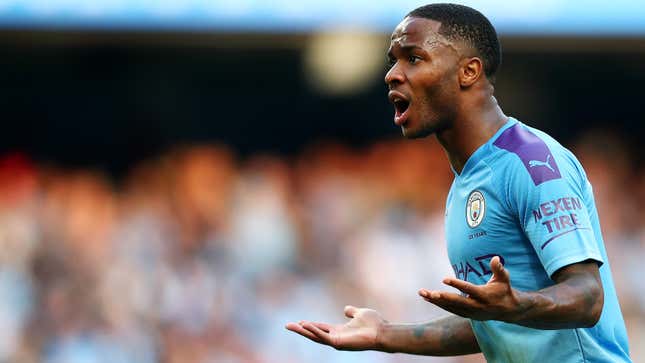
For the second time in as many weeks of the new Premier League season, the biggest story from the weekend was another ruinously stupid imposition of VAR. The only thing more tiring than having to write the umpteenth anti-VAR post is having to witness video replay poison this wonderful sport from week to week.
The latest example of bad VAR was a familiar one: Manchester City, scrambling for a late goal to put them ahead of Tottenham, found a last-gasp winner in stoppage time only for the ensuing joyous bedlam ripped away by a ticky-tack infraction upon review.
Nobody liked this call. Ending a fantastic match—and fantastically one-sided one, as Man City completely dominated—with a confusing call, made after the fact, in support of a bad rule that no one noticed had been broken in the moment, was profoundly unsatisfying. Even VAR optimists who maintain faith that VAR will ultimately prove to be a force for good had to admit that the conclusion of this match was some bullshit.
However, the growing consensus from the optimist crowd seems to be that the new handball rule, not VAR itself, is the true villain behind this decision. For example:
That kind of thinking is tempting, even if it’s wrong. The new handball rule really is bad. This year’s tweaked rule reads as follows: “Any goal scored or created with the use of the hand or arm will be disallowed this season, even if it is accidental.” In this case, it was Aymeric Laporte’s arm’s slight, inadvertent contact with the ball before it fell to non-scorer Gabriel Jesus that ruled the goal out. Man City’s own İlkay Gündoğan gave a quick and clear explanation for why this rule isn’t good:
As bad as the rule is, though, VAR is much worse. In terms of what is ailing soccer today, the new handball rule is a common cold. It sucks, it’s annoying, it can lay you out for a few days as you suffer from it, and while there is no cure—it’s impossible to come up with a perfect handball rule—ultimately it holds no existential risk. Handball controversies have existed forever without killing the sport, and if this rule’s new language proves unpopular, the powers that be can just change it.
If the handball rule is a cold, then VAR is cancer. It infects the sport from the inside, turns the body’s own lines of defense—its rules—against itself, and changes how the body itself functions. Think whatever you want about the rightness or wrongness of City’s disallowed goal, and about the rule itself; much more important than that call or rule is that VAR can take a totally unobjectionable moment, and by slowing, pausing, reversing, and zooming the footage to an inhuman extent, spot infractions that were not and likely cannot be flagged in live time.
VAR fundamentally shifts the ontological frame from the human to the technological. It’s the same as last week, when VAR disallowed a gorgeous Man City goal because it decided that Raheem Sterling’s shoulder was offside by a couple centimeters. What happens on the field is no longer determined on the human scale of the players, referees, and fans in attendance, but instead on the cold, delayed, deceptively precise judgments from technology’s vantage point. The privileged eye is the camera’s, not the human’s.
The handball rule can be good or bad, but either way it is changeable, marginal, and self-contained. VAR is permanent, pervasive, and omnipresent. To think about which one is worse, try to imagine a world without one or the other.
Without VAR, today’s discussion of the new handball rule would probably be limited to a few salty Spurs fans griping about the blown call on Jesus’s winner, the rest of us happy that the refs didn’t ruin the most exciting moment of the young season with a dumb handball. Without the new handball rule, VAR would still cast its shadow over everything, would still kill goals due to imperceptibly small offenses, would still create in your mind doubt about the reality of every goal you see until the ref, after standing around for a minute or two, blows his whistle to confirm what you saw either did or did not count. I know which world I’d rather live in.